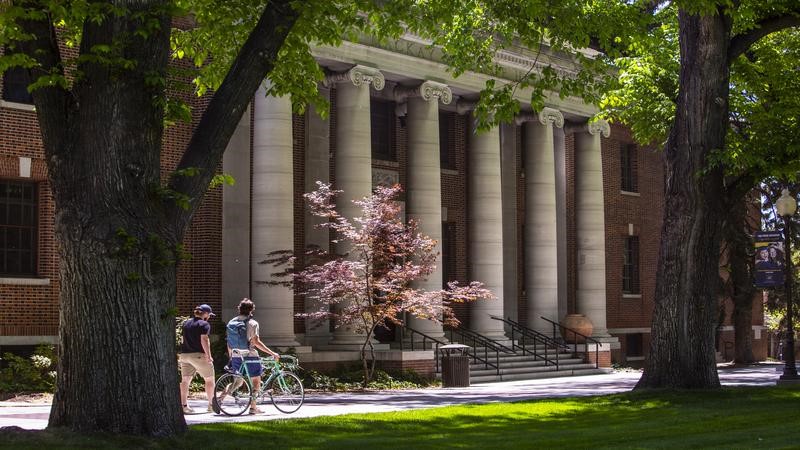University General Course Catalog 2025-2026
Graduate School
|
|

Dr. Markus Kemmelmeier, Vice Provost, Graduate Education and Dean, Graduate School
gradadmissions@unr.edu
http://www.unr.edu/grad/
Student Service Building, Room 225
(775) 784-6869
History of the Graduate School
Graduate-level training and research is a vital function of the University of Nevada, Reno. Post-baccalaureate study has been offered at the university since 1887, and the university awarded its first advanced degree in 1903. The activities of the graduate faculty and students in research and scholarship reinforce the mission of this land-grant university.
To fulfill the university’s missions in education, research and public service, the graduate faculty encourages students to develop the skills of intellectual inquiry and critical analysis. It trains them in both the disciplinary and interdisciplinary skills necessary for problem solving, and fosters a dedication to creative thought and the search for knowledge.
Today’s Graduate School
The campus now has over 3000 graduate students out of a total enrollment of more than 18,000 students. The university has emerged as a first-class doctoral granting university. It offers a wide range of graduate programs, including selected doctoral and professional studies, which emphasize those programs and activities that best serve the needs of the citizens of the state, region, and nation.
Advanced Degrees and Majors
Supported by a variety of research centers and institutes, research services and library holdings, the university offers graduate study leading to the advanced degrees of:
Executive Master of Business Administration (E.M.B.A.),
Master of Accountancy (M.Acc),
Master of Arts (M.A.),
Master of Arts for the Teaching of Mathematics (M.A.T.M.),
Master of Business Administration (M.B.A),
Master of Education (M.Ed.),
Master of Fine Art (M.F.A.),
Master of Judicial Studies (M.J.S),
Master of Justice Management (M.J.M.),
Master of Music (M.M.),
Master of Public Administration (M.P.A),
Master of Public Health (M.P.H),
Master of Public Health Epidemiology (M.P.H.E),
Master of Nursing/Public Health (N.P.H.),
Master of Science (M.S.),
Master of Sciense Nursing (M.S.N.),
Master of Social Work (M.S.W.),
Doctor of Education (Ed.D.)
Doctor of Musical Art (D.M.A.)
Doctor of Nurse Practitioner (D.N.P.), and
Doctor of Philosophy (Ph.D.).
In addition, certain professional degrees are granted in engineering, medicine and mines.
Master’s degree programs require proficiency in the area of specialization as evidenced through advanced course work and scholarship endeavors via a thesis or a professional paper. The Doctor of Philosophy (Ph.D.) degree is conferred for work of distinction, in which the student displays original scholarship and achievement.
Graduate Student Categories & Fees
Post-baccalaureate students can be eligible to take graduate courses as either:
(a) a graduate special student; or,
(b) a regular graduate standing student.
Graduate Special Students
The graduate special classification is for students who have earned a bachelor’s degree who wish to take graduate courses but do not plan to pursue a program leading to an advanced degree, or for applicants who do not meet the requirements for admission to regular graduate standing. Admission to graduate special status does not constitute admission to graduate standing in the Graduate School.
With graduate special classification, a student may enroll for undergraduate or graduate units and may satisfy the teacher licensure requirements. Department or Program approval must be obtained for every course taken. Students must be able to demonstrate that they satisfy the prerequisites for each course in which they plan to enroll.
A student with graduate special classification may apply for regular graduate standing by first meeting the Graduate School requirements for admission (see below) and then the specific admission requirements of the particular program. A maximum of twelve (12) graduate special/transfer semester units taken prior to admission to regular graduate standing may be applied to the program of study.
An international student who holds a student visa is not eligible for admission to the graduate special classification, and cannot register for courses as a graduate special.
Fees
Graduate students are required to pay the application fee, the per-unit registration and capital improvement fees, specialized instruction expenses, new graduate student orientation fee, and tuition (for out-of-state students). In addition, there are fees for the student health services, counseling services, the Graduate Student Association, operating costs for the student union, and for use of the recreation building. The summer session fees are detailed on the Cashier’s website: http://www.unr.edu/tuition-and-fees.
Grants-in-aid to cover the per-unit and capital improvement fees, as well as out-of-state tuition fees, may be awarded to graduate assistants, trainees, and fellows, provided such conditions are specified in their contracts.
Related Information
|